Bob Sparks: Praying for victims and for solutions going forward
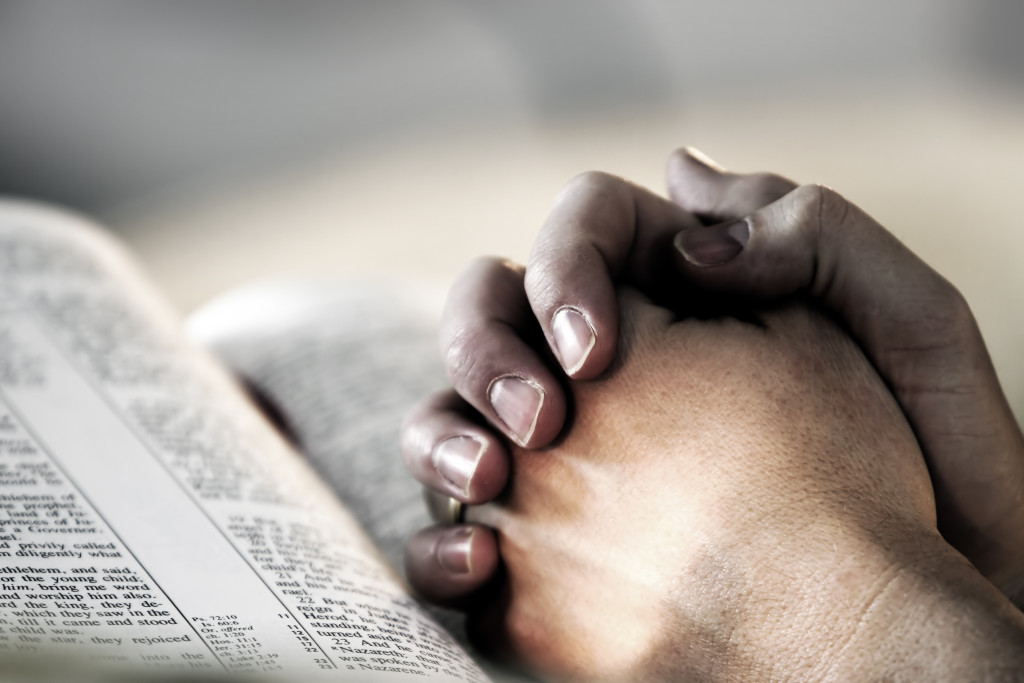
On Nov.13, Islamic radical terrorists killed 130 innocent people in Paris. The world mourned with the French and offered thoughts and prayers. Some of us added the French flag overlay to our social media pages. The perpetrators were bent on killing as many “infidels” (or Muslims if they happened to be in the vicinity) as possible. France, as a country, huddled together and shared their collective grief. Nearly all of America came together to mourn with America’s oldest friend. On Dec. 2, Tashfeen Malik and her husband, Syed Farook, slaughtered 14 government workers in San Bernardino, California. When the reality of the carnage became known, this country reacted far differently than our friends in Paris. It is safe to say that most Americans who believe in God may have looked upward and asked, “Why?” Others then offered thoughts and prayers to the victims and their loved ones. It was both incredible and sickening to see such a normal human reaction openly mocked and demeaned by callous liberals and atheists. Their rebuke to those seeking and offering comfort was on the front page. The New York Daily News, in true tabloid fashion, screamed “God Isn’t Fixing This” in letters large enough to consume most of the front page. That editorial on the news pages was in reaction to the public comments by prominent Republicans offering “thoughts and prayers.” Democratic U.S. Sen. Chris Murphy of Connecticut took to Twitter to respond: “Your ‘thoughts’ should be about steps to take to stop this carnage. Your ‘prayers’ should be for forgiveness if you do nothing – again.” Murphy is just one example of a full-throated verbal assault on the National Rifle Association, blaming the organization, and CEO Wayne LaPierre in particular, for the attacks. Again, the New York Daily News is speaking for those of that mindset. “He’s a terrorist,” blared the headline surrounding a picture of Farook. Further down, the words “But so are these guys” hover above photos of recent domestic terrorists, whose names must not be remembered. Then, to the lower right, the paper posts a photo of LaPierre below the words “(AND this guy)” What the Daily News and thoughtful people have in common is the outrage that mass shootings keep happening in this country. We agree that aggressive steps are necessary to prevent a wave of future attacks. Those who think the guns are the sole problem also talk about “common-sense” gun regulation. What does that mean? I am not here to defend the NRA (I am not a member), but look at Paris. France has some of the strictest gun laws in the world. Let that sink in for a moment and then ask what good did that do to prevent the terrorist attack? The polls say a large majority of Americans support tighter gun laws. That’s perfectly understandable. Americans are looking for ways to make such killings stop. Why didn’t gun control work in France? Because it’s easy to buy the weapons on the black market, then bring them across the open borders throughout Europe. Let us say we pass French-style gun laws: How does that solve the problem? The ability of terrorists to bring themselves and illegal weapons across our borders is almost as easy as it is in France. Fully securing our borders would be one way to prevent future terrorist attacks such as the one carried out in San Bernardino. It would actually keep bad guys and guns from entering our communities. Why does that never get beyond the talking stage? “Common-sense” reforms should be open for discussion. For instance, is the “gun show loophole” resulting in guns getting into the wrong hands and used for criminal purposes? If it is a genuine problem, let’s talk. We are now at an advanced stage on the danger meter. ISIS is attracting more followers in this country. Another way to protect our citizens would be to do what it takes to defeat ISIS. It is tough to attract recruits to a losing cause. That will take commitment and leadership. It is a sorry state of affairs when a terrorist attack causes liberals to forget who did the killing. Wayne LaPierre and those praying for the dead are not responsible for it. That belongs to Farook and Malik, and those who support them. I will run the risk of earning the wrath of unhinged liberals and atheists by quoting from a piece by Emma Green, managing editor of the The Atlantic’s online site. Commenting on the obscene backlash against prayers for the victims, she wrote: “The most powerful evidence against this backlash toward prayer comes not from the Twitterverse, but from San Bernardino. ‘Pray for us,’ a woman texted her father from inside the Inland Regional Center, while she and her colleagues hid from the gunfire. Outside the building, evacuated workers bowed their heads and held hands. They prayed.” Amen. Bob Sparks is a business and political consultant based in Tallahassee. For more state and national commentary visit Context Florida.
Martin Dyckman: They pander the repulsive to the bigoted

The letters, mailed from Vienna in the summer of 1938, spoke of enthusiasm and hopefulness at the prospect of coming to the United States. Nothing revealed the reason except for the stationery that had been hand-altered to show a new address. It was a few months after Hitler had taken over and life was becoming as difficult for Jews in Austria as in Germany. The letters had been sent to relatives in Brooklyn and were in my mother’s papers when she died nearly a half century later. I had them translated from the German. Dr. Jakob Neuer, a lawyer, assured his kin that if they sponsored them, he, his wife and their 13-year-old son, Richard, would not need charity in the United States. “We Neuers want to work,” he wrote. There was one problem. Although he was considered German and qualified for an early visa, his wife was classified Polish. For her, there was a three-year waiting list. The quota had been established in large part to keep Jews out. The Neuers did not have three years. They made it only as far as France, where safety was short-lived. Jakob and his brother, sister-in-law and nephew died in Auschwitz. Richard helped his mother escape to Switzerland and spent the war living by his wits in southern France. In a novel he wrote in French years later, he described an American consul in Vichy France as ever so courteous, always smiling, always saying maybe later. In fact, maybe later meant never to the anti-Semites at the State Department. In 1939, about 900 Jews boarded the steamship SS St. Louis at Hamburg, bound for Cuba, expecting eventually to reach the United States. But the Cubans reneged on the visas they had sold them. They turned the ship away. So did the United States. When it reached Miami, the Coast Guard patrolled the harbor to make sure no one swam for shore. President Franklin Roosevelt ignored their appeals. Although he was a German, ship captain Gustav Schroder refused to take his despairing passengers back to Hamburg. He docked at Antwerp, where Great Britain, France and other western European nations agreed to accept the refugees. By the end of the ensuing war, the Nazis had murdered 250 of them. Polls from that period showed the American public strongly opposed to admitting Jewish refugees, even when the proposal was to take only 10,000 children. It was left to the British to do that. All this comes to mind, with stomach-wrenching disgust, with the news of Jeb Bush and other politicians calling for discrimination against Muslims in admitting Syrian refugees to the United States. Then, the pretext was that the Jews might include German spies. Never mind that the U.S. abounded with native-born, German-speaking Nazi sympathizers. Now, the pretext is that there might be terrorists among the Syrian refugees. Never mind that it was a fake Syrian passport found with one of the Paris terrorists or that they were all European citizens, not refugees. And never mind the eternal shame for closing our borders to Hitler’s intended victims. Unlike Ted Cruz, Donald Trump, and Chris Christie – who give new meanings to the word “vile” – Bush attempted to clarify his initial statement calling for preference to Syrian Christians. He said he supports welcoming women, children and orphans of any religion. But what about Muslim men? Does Bush mean to keep them out and let only their wives and children in? How does that comport with family values? But at least he’s a shade better than Christie, who said he would not permit even “a 3-year-old orphan” into his state. “Today’s Syrian orphan, it seems, is 1939’s German Jewish child,” said an Internet posting from the Baptist Joint Committee for Religious Freedom. Any form of religious discrimination is an insult to the American flag. No one who stands for that sort of vetting deserves to sit on a soil and water conservation board, let alone in the Oval Office. Mea culpa. I wrote earlier this month that Bush, unlike the candidates atop the Republican popularity polls, would be a “credible successor to the Oval Office.” Now, he is explaining yet another rash statement and is also calling for sending U.S. troops into Syria. Has he learned nothing, nothing from his brother’s ghastly blunder? It must be in the genes. President Obama called this one right. “When I hear folks say that, well, maybe we should just admit the Christians but not the Muslims, when I hear political leaders suggesting that there would be a religious test for which a person who’s fleeing from a war-torn country is admitted, when some of those folks themselves come from families who benefited from protection when they were fleeing political persecution, that’s shameful. That’s not American. That’s not who we are. We don’t have religious tests to our compassion.” But it appears that some of us do, including a few who fancy themselves fit to be president. Either they are cowards, catering to the undisguised bigotry and frothing xenophobia that represents a sizable segment of Republican voters, or they are simply bigots themselves. None deserve any decent citizen’s vote. Martin Dyckman is a retired associate editor of the newspaper formerly known as the St. Petersburg Times. He lives near Asheville, North Carolina.
Jeb Bush and Hillary Clinton seek to grab leadership mantle after Paris

In a presidential campaign that has suddenly shifted in focus to terrorism and security, Democrat Hillary Rodham Clinton and Republican Jeb Bush both see opportunities to cast themselves as best prepared to be commander in chief in tumultuous times. In back-to-back foreign policy speeches this week, Clinton and Bush outlined blueprints for defeating the Islamic State, the extremist group blamed for last week’s attacks in Paris that killed 129 and left hundreds more wounded. While some of the details differed, most notably on the role of U.S. ground forces, the plans of both candidates are grounded in a belief the next president must be more aggressive than the current one in order to defeat the Islamic State group. “It is time for American leadership again,” Bush said Wednesday in remarks from The Citadel. Clinton echoed that sentiment one day later, declaring: “This is a time for American leadership.” Bush and Clinton’s dueling speeches were a reminder of a time when the 2016 general election seemed destined to be a contest between members of two prominent American political families seeking a return to the White House. Clinton’s campaign has so far proceeded largely according to plan. After spending the summer struggling with questions about her use of a private email account and server while secretary of state, she has steadied her campaign and appears to be in strong position to fend off a challenge from Vermont Sen. Bernie Sanders, an independent seeking the Democratic nomination. Bush’s bid for the Republican nomination, however, has so far been a stunning disappointment to many of his supporters. While the former Florida governor raised eye-popping sums of money for his super PAC, he’s struggled to connect with voters and gain traction in a crowded GOP field dominated to date by political novices Donald Trump and Ben Carson. Bush backers have long predicted — and more recently, nervously hoped — that as voting draws closer, Republican voters would begin evaluating candidates less on their visceral appeal and more on competency and policy expertise. Bush’s speech at The Citadel had been planned for weeks, but the Paris attacks gave him an opportunity to remind voters that the next president will quickly confront vexing problems. “If these attacks remind us of anything, it is that we are living in serious times that require serious leadership and that the free world needs to act,” Bush said. He advocated bolstering the U.S. military’s presence on the ground in Syria and Iraq, but didn’t say how many troops he envisioned sending into the chaotic region, nor did he outline what functions they would carry out. Bush’s remarks were generally well-received by Republicans, though there was little sense that they marked a turning point for his struggling candidacy. “What he said was fine,” said former Sen. Jim Talent, a Republican from Missouri who has advised GOP presidential candidates on foreign policy. “I don’t know that it breaks him out of the pack through.” Clinton’s remarks Thursday served as a reminder of her fluency on international issues, cultivated in part during her four years as President Barack Obama‘s secretary of state. Her biggest risk comes from being associated with Obama’s foreign policy, given that polls show the public is increasingly pessimistic about the president’s handling of world affairs. While Clinton has been careful to avoid criticizing Obama’s approach to the Middle East, she emphasized in her remarks the ways she would tackle the situation differently, including setting up a no-fly zone over Syria. Bush, too, supports a no-fly zone, as well as the creation of “safe zones” to offer protection to Syrians. Bush and Clinton were also in agreement in their calls for arming the Kurds, one of the most effective fighting forces in the region, and bolstering the involvement of Arab partners. “They’re both part of a broader political consensus that seems to have developed over the course of the campaign that the U.S. needs to do more,” said Nick Heras, a Middle East researcher at the Center for New American Security, a Washington-based think tank. The candidates’ starkest difference came on the issue of sending American ground troops into Iraq and Syria to directly fight the extremists. While Bush said that step was imperative, Clinton said she would resist deploying ground forces even if the U.S. were directly attacked. Asked whether it would really be possible to resist calls for such action in the wake of a terror attack on U.S. soil, Clinton conceded there would be enormous pressure. But, she added, “I think it would be a mistake.” Republished with permission of the Associated Press.
GOP candidates disavow Donald Trump’s call for Muslim database
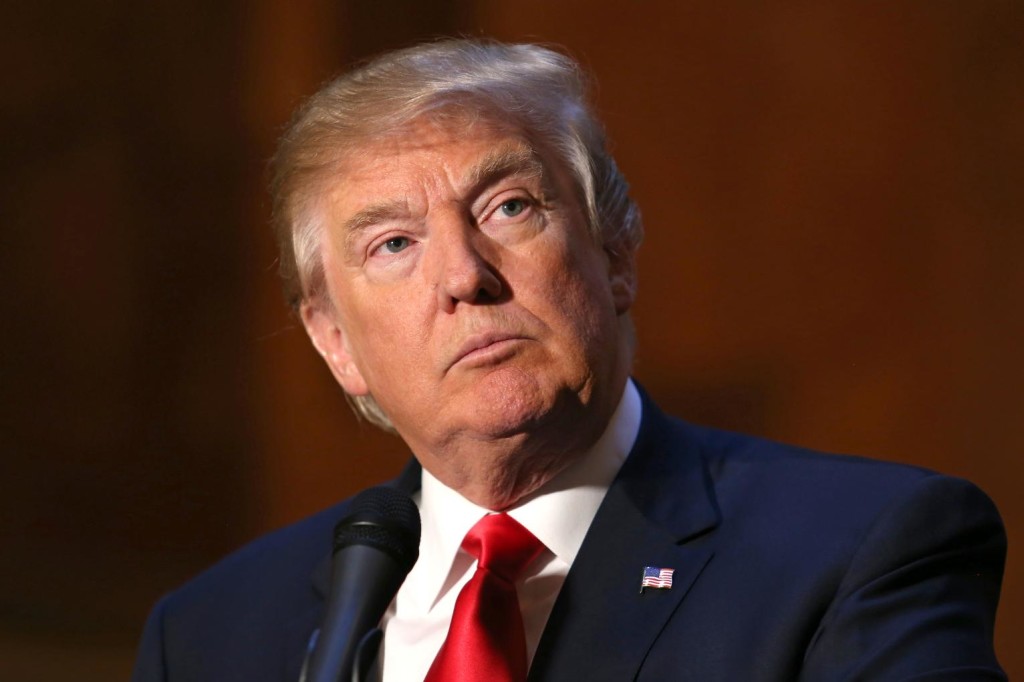
Republican presidential candidates on Friday swiftly condemned Donald Trump‘s call for requiring Muslims in the United States to register in a national database, drawing a sharp distinction with the GOP front-runner. Former Florida Gov. Jeb Bush called Trump’s proposal “abhorrent.” Ohio Gov. John Kasich said Trump was trying to “divide people.” And Texas Sen. Ted Cruz, who has largely avoided criticizing Trump throughout the 2016 campaign, said that while he was a fan of the billionaire businessman, “I’m not a fan of government registries of American citizens.” “The First Amendment protects religious liberty and I’ve spent the past several decades defending the religious liberty of every American,” Cruz told reporters before a town hall-style event in Sioux City, Iowa. The rebuke followed Trump’s call Thursday for a mandatory database to track Muslims in the U.S. In a video posted on MSNBC.com, Trump was asked whether Muslims would be required to register. He replied, “They have to be.” He said Muslims would be signed up at “different places” and said the program would be “all about management.” Religious and civil liberties experts said Trump’s idea is unconstitutional on several counts. The libertarian Cato Institute’s Ilya Shapiro said the idea also violates basic privacy and liberty rights. The comments follow the terror attacks in Paris that killed 130 people and wounded hundreds more. The Islamic State group has claimed responsibility for the carnage, elevating fears of attacks in the U.S. and prompting calls for new restrictions on refugees fleeing war-torn Syria. Democratic front-runner Hillary Rodham Clinton took to Twitter Friday and challenged all Republican candidates to disavow Trump’s comments. “This is shocking rhetoric,” she wrote. “It should be denounced by all seeking to lead this country.” Several did just that. “You’re talking about internment, you’re talking about closing mosques, you’re talking about registering people, and that’s just wrong,” Bush said Friday on CNBC. A spokesman for Sen. Rand Paul, R-Ky., said the candidate “does not support databases based on one’s religion.” Kasich, the Ohio governor, said requiring people to register with the federal government because of their religion “strikes against all that we have believed in our nation’s history.” Kasich has faced criticism following the Paris shooting for saying he would set up an agency with a “mandate” to promote what he calls “Judeo-Christian values” overseas to counter Islamist propaganda. The campaign trail comments come amid a debate on Capitol Hill about refugees from the Middle East. The House passed legislation Thursday essentially barring Syrian and Iraqi refugees from the United States. Senate Majority Leader Mitch McConnell, R-Ky., has slotted the bill for possible Senate consideration, though it’s unclear whether the chamber could get enough votes to override a veto by Obama, who opposes the measure. The unified pushback against Trump was rare. Republicans have vacillated in their handling of other inflammatory comments from the bellicose billionaire, wary of alienating the front-runner’s supporters but also increasingly concerned that he’s managed to maintain his grip on the GOP race deep into the fall. Legal experts quickly weighed in to outline the unconstitutionality of Trump’s proposal. “Individuals cannot be singled out for government surveillance and monitoring based on their religious beliefs,” said Steven Shapiro, the legal director of the American Civil Liberties Union. Marci Hamilton, a Yeshiva University legal expert on religious liberty, said requiring Muslims to register appears to be a clear violation of the Constitution’s protection of religious freedom. “What the First Amendment does and what it should do is drive the government to use neutral criteria,” Hamilton said. “You can use neutral criteria to identify terrorists. What it can’t do is engage in one-religion bashing. That won’t fly in any court.” Ben Carson, the retired neurosurgeon who has challenged Trump’s standing atop the GOP field, raised eyebrows Thursday when he compared blocking potential terrorists posing as Syrian refugees from entering the U.S. to handling a rabid dog. “If there’s a rabid dog running around in your neighborhood, you’re probably not going to assume something good about that dog,” Carson told reporters at a campaign stop in Alabama. “It doesn’t mean you hate all dogs, but you’re putting your intellect into motion.” The Council on American-Islamic Relations condemned both Trump and Carson’s comments as “Islamophobic and unconstitutional.” “Donald Trump and Ben Carson are contributing to an already toxic environment that may be difficult to correct once their political ambitions have been satisfied,” CAIR’s Robert McCaw said in a statement. A super PAC supporting Kasich had started running a television advertisement in New Hampshire questioning Trump and Carson’s preparedness for being commander in chief. The ad opens with pictures of Trump, Carson and President Barack Obama as a narrator says, “Job training for president does not work.” The ad then pivots to a review of the national security issues facing the country and argues Kasich is the only candidate with a plan to defeat the Islamic State. The first reference to a database for Muslims came in Trump’s interview with Yahoo News published earlier Thursday in which the billionaire real estate mogul did not reject the idea of requiring Muslims to register in a database or giving them special identification cards noting their religion. “We’re going to have to look at a lot of things very closely,” Trump told Yahoo News. He also suggested he would consider warrantless searches, according to Yahoo, saying, “We’re going to have to do things that we never did before.” Asked by reporters Thursday night to explain his Yahoo comments, Trump suggested his response had been misconstrued. “I never responded to that question,” he said. Republished with permission of The Associated Press.
Mo Brooks likens Barack Obama’s ISIS policy to poking a rattlesnake
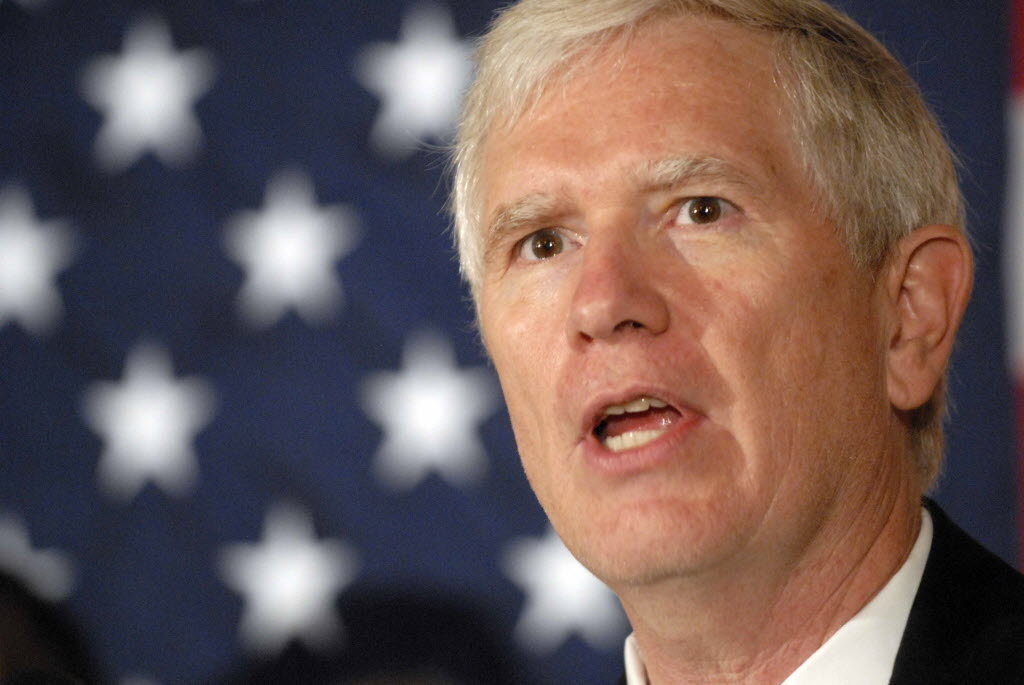
Republican U.S. Rep. Mo Brooks (AL-05) isn’t sugar-coating his opinions of President Barack Obama‘s foreign policy plans these days, invoking lessons he’s learned growing up in the South. “The problem with the President’s policy is akin to a person who likes to poke a rattlesnake in the eye with a finger,” Brooks explained. “Sooner or later you’re gonna get bit.” “Long ago, we Southerners learn that either kill that snake or you stay away from it. You don’t play with it. And the President needs to learn that message real quick before more lives are lost.” Brooks is the latest congressional Republican expressing outrage over the President’s plans to admit 10,000 refugees from the Syrian civil war next year, worrying it will allow the Islamic State in Iraq and Syria (ISIS) to gain a foothold on American soil. The Alabama lawmaker on Thursday hammered Obama’s foreign policy while talking to Alabama Today, saying it reminded him of a old TV show featuring fictional, incompetent policemen. “It reminds me of the old Keystone Cops show, which is somewhat humorous,” Brooks recalled the show from the early 20th century. “The distinction is this version of the White House Keystone Cops is potentially deadly for Americans.” The debate over the refugees has reached fever-pitch in the wake of last Friday’s Paris terrorist attacks, following reports from the French city the one of the Islamic attackers involved entered Europe as part of the wave of Syrians fleeing civil war. “It’s quite clear that Barack Obama and the White House have absolutely no idea how to confront the Islamic State Junior Varsity team, as Barack Obama likes to call them,” Brooks continued. “And that incompetence and ineptitude in the White House is risking American lives and has already cost untold thousands of lives around the planet.” House Republicans are expected to vote on a bill Thursday — the America SAFE Act — that would halt the refugee resettlement program until the administration can provide assurances that none of the refugees admitted pose a security risk to the U.S. “If I were to sum up Barack Obama’s position on the Syrian refugees, the word that comes to mind is masochism,” Brooks retorted. “But that’s not really fair to masochists because they only injure themselves. Barack Obama is surrounded by Secret Service, he’s protected. He’s not putting himself at risk, he’s putting Americans at risk.”
Josh Earnest gives props to Obama administration for Paris attacks response
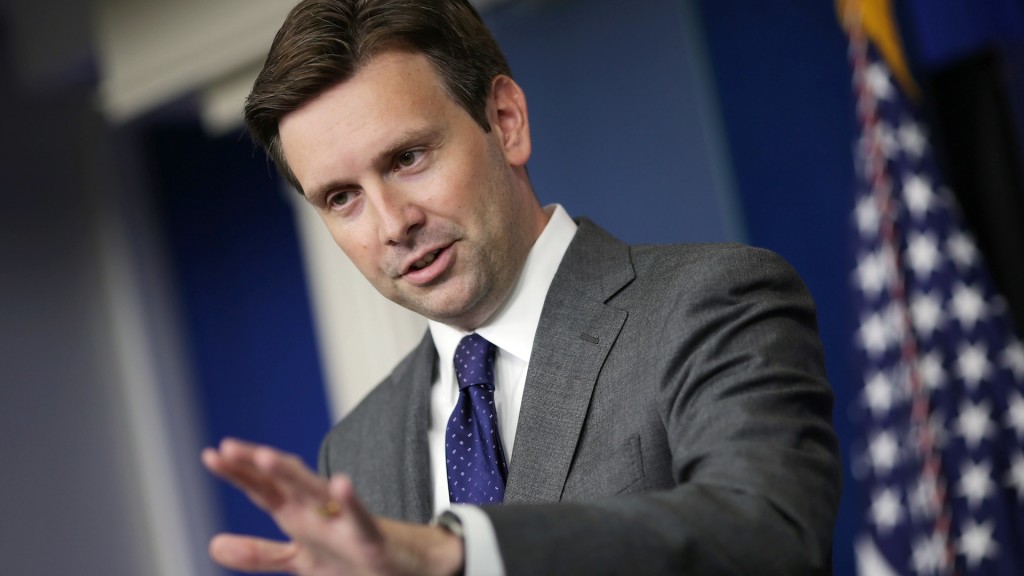
White House Press Secretary Josh Earnest credited President Obama‘s “early investment in our military and our intelligence” that put the French “in a position to carry out this kind of response” to last week’s Paris attacks. Earnest spoke Wednesday on MSNBC’s “Morning Joe” program. “The United States and France has been for some time working to deepen our military and intelligence cooperation when it comes to Syria,” Earnest said. “And we have done that and we followed through on that. “And it is because of that cooperation and because of the kind of logistical support that only the United States can provide, that France is actually even in a position to ramp up the strikes that they took,” he added. “So we’re seeing the fruits of (President Obama’s) early investment based on the France carrying out these actions.” For example, also Wednesday, police raided a suburban Paris apartment where they believed the suspected mastermind of last week’s attacks was holed up. The Islamic State group has claimed responsibility. Wednesday’s operation ended with two deaths and seven arrests but no clear information on the fugitive’s fate. The dead included a woman who blew herself up with an explosive vest and a man hit by projectiles and grenades at the end of a seven-hour siege in the Paris suburb of Saint-Denis. “I think what is also true, what you’ve also seen, is the United States use all of our law enforcement and intelligence resources to assist the French as they carry out their investigation and even conduct some of the law enforcement activities that they’ve been engaged in,” Earnest said. “So we are committed to being sure that we are standing shoulder to shoulder with our oldest ally as they confront this threat on their own soil,” he said. “There should be no denying the fact that the only reason that the French are in a position to carry out this kind of response is because of the early investment in our military and our intelligence that the President ordered more than a year ago.” But former FBI special agent Clint van Zandt told U.S. News & World Report on Tuesday that France’s heavy response doesn’t necessarily mean Islamic State won’t try to attack within the United States. ” … I think it’s a logical escalation for them to do,” van Zandt told the magazine. “If one wants to expand their base of recruits, one of the ways you do it is showing success.” The video can be watched here: http://on.msnbc.com/1PzKOFr The Associated Press contributed to this report.
Donald Trump says he would consider closing certain mosques
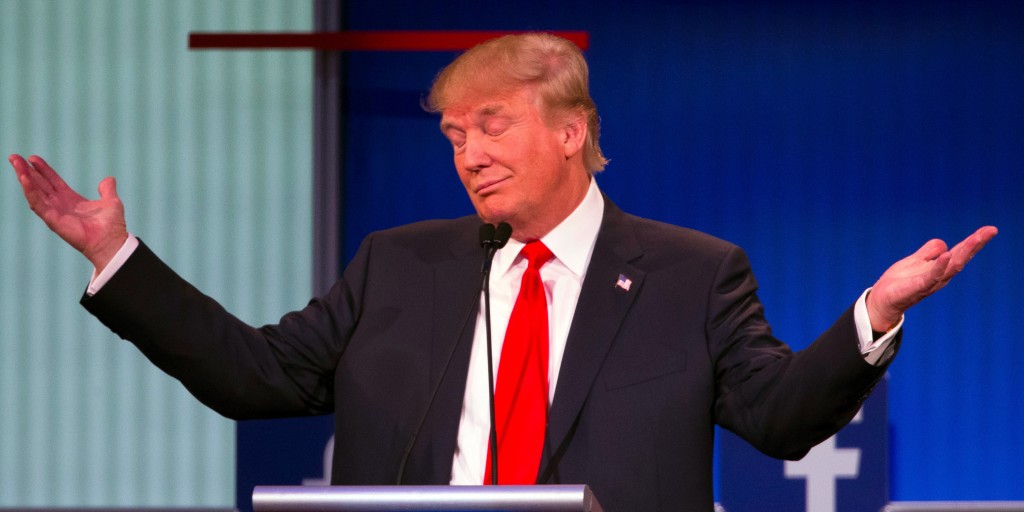
Republican presidential candidate Donald Trump says he would consider closing U.S. mosques with radical leadership because of the Paris attacks if he were elected president. “I would hate to do it, but it’s something that you’re going to have to strongly consider,” Trump told MSNBC in a phone interview Monday. Trump and his rivals have been working to articulate how they would respond to last week’s attacks, which killed 129 people and left hundreds wounded. Trump, who has been pushing for a more aggressive response, also said Americans must reassess some of their civil liberties in response to growing threats from the Islamic State group. “We have to be much tougher,” he said in another interview on CNBC. “We are going to have to give up certain privileges that we’ve always had.” “Surveillance took a big turn over the last 48 hours,” he added. “Forty-eight hours ago everybody was saying, ‘Well we want our freedoms, we don’t want this to happen.’ And now, all of sudden, people are saying, ‘Hey listen, you can listen to my phone conversations.’” That surveillance, he argued, should include intelligence-gathering in and around mosques. “Well you’re going to have to watch and study the mosques because a lot of talk is going on at the mosques,” said Trump, who complained that New York City, where he lives, has ramped down its efforts to infiltrate places of Muslim worship. Trump appeared to be referring to the New York Police Department‘s Demographics Unit, which The Associated Press reported in 2011 was spying on Muslims and mosques around the city with help from the CIA. The group assembled databases on where Muslims lived, shopped, worked and prayed, infiltrated Muslim student groups, put informants in mosques and monitored sermons. The NYPD, under Mayor Bill de Blasio, announced it had abandoned the program in April of last year following lawsuits and complaints. Trump told a weekend rally that things would have turned out differently in Paris had the victims of the attacks been armed with guns. He repeated that assertion in the CNBC phone interview. “Had there been some guys with a gun, there would have been a shoot-out and probably the primary people that got whacked would have been the killers,” he said. “Had there been other people carrying weapons, you would have had a lot different story, believe me.” Trump criticized President Barack Obama for not moving earlier to destroy the Islamic State sites that France bombed over the weekend. He said the U.S. should be going more aggressively after the group’s oil and financing and pressing other countries to intensify their fighting against the radicals. Republished with permission of The Associated Press.
Ben Carson: Congress should stop funding refugee resettlement
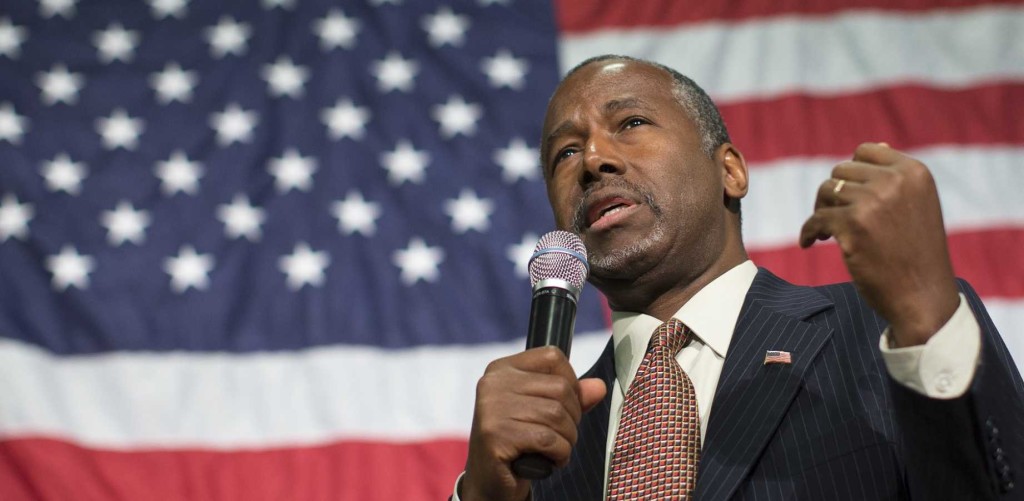
Republican presidential candidate Ben Carson is calling on Congress to withdraw funding to resettle Syrian refugees in the United States, arguing there is no credible way to tell the difference between an Islamic State militant and an innocent citizen fleeing war. In a letter to House Speaker Paul Ryan, Carson urged congressional Republicans to “extinguish” Syrian resettlement programs, saying the United States “cannot, should not and must not accept any Syrian refugees.” Carson joins other GOP presidential candidates expressing caution or outright opposition to resettling Syrian refugees in the U.S. Elsewhere across the political landscape, at least 10 governors, including Michigan and Alabama, have taken action to block resettlements or said they are exploring their legal options. Members of the Republican-controlled Congress, too, said on Monday they will try to use must-pass government spending legislation to block President Barack Obama‘s plans to increase the flow of Syrian refugees into the U.S. Obama earlier this year announced plans to accept as many as 10,000 Syrian refugees this fiscal year, up from 2,000 in fiscal 2015. The State Department manages refugee resettlement with the aid of private organizations like Catholic Charities. Democratic presidential candidates have called for the U.S. to continue to let in Syrian refugees, but only after proper background checks. Carson suggested no such practical solution exists where Syrian migrants are concerned. “This is a relatively unique situation for our country,” he said. Carson, who is near the top of many GOP presidential preference polls, joins Texas Sen. Ted Cruz, former Arkansas Gov. Mike Huckabee and Florida Sen. Marco Rubio as candidates who have called for closing American borders to Syrians. Former Florida Gov. Jeb Bush suggested over the weekend that the United States restrict admission only to Syrian Christians. Louisiana Gov. Bobby Jindal on Monday issued an executive order intended to block Syrian refugees from being resettled in his state. Obama on Monday chided Republicans he says are effectively imposing a “religious test” on people fleeing war. “That’s not American. That’s not who we are,” the president said. Carson retorted, “Of course we don’t apply religious tests, but we should apply an ideological test. I would be very reticent to bring in people ideologically opposed to the ideals of America.” He did not explain the distinction between testing for ideology and religious belief. As for the Syrian refugees already in the United States, Carson said, “I would watch them very carefully.” Carson’s idea of cutting off funding would face roadblocks on Capitol Hill, particularly in the Senate, where Republicans do not have the votes to stave off a Democratic filibuster. But House Budget Chairman Tom Price issued a statement on Monday saying the United States “must suspend our refugee program until certainty is brought to the vetting process.” Republished with permission of The Associated Press.
Jeff Sessions, lawmakers try to block Syrian refugee plan
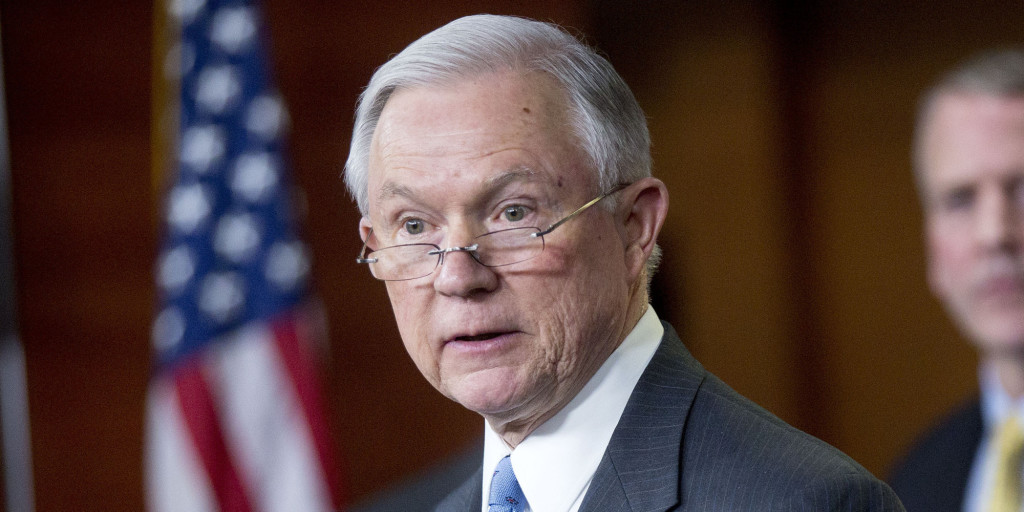
Republican lawmakers may try to use must-pass government spending legislation to block President Barack Obama’s plans to increase the number of Syrian refugees entering the U.S. Pressure to do so follows Friday’s deadly attacks in Paris. Congress is facing a Dec. 11 deadline to approve a spending bill to keep the government running. Republican Sen. Jeff Sessions of Alabama released a letter on Monday saying the legislation should require congressional approval for the president’s refugee resettlement plans and the money needed to carry them out. New House Speaker Paul Ryan of Wisconsin tells conservative talk host Bill Bennett on Monday that he’s looking at all options. In September the White House announced plans to accept an additional 10,000 refugees from Syria, with no congressional approval needed. Republished with permission of The Associated Press.
Steven Kurlander: Faux unité avec Paris — ditching internationalism to protect the American Dream

Over the weekend, images of wanton bloodshed in Paris were conveyed to Americans. Unlike ISIS’ other barbaric attacks, including the horrific bombing of a Russian airliner about a week previous, this attack seemed to hit closer to home. The Paris attacks raised the level of concern and awareness of the ISIS threat to this country. An attack on a major U.S. city was feared next, and expected by many anxious Americans. Immediately, the coordinated attacks in Paris that killed scores of innocent civilians were described by the media and our political leaders strictly in terms of another act of barbaric terrorism against Western civilization. “The killing of innocent people based on a twisted ideology is an attack not just on France, not just on Turkey, it is an attack on the civilized world,” President Barack Obama said at the start of a G20 summit in Ankara, Turkey. In turn, millions of Americans showed solidarity with the people of France, many of us adopting the French tricolor flag as our profile picture on social media sites such as Facebook. We are supposedly all the same citizens of the same Western world. Unlike ISIS, we are, of course, civil people in the truest sense of the word. That mantra was confirmed in the Democratic debate Saturday night by former Secretary of State Hillary Clinton, an architect and continued advocate of such international policies: “But it cannot be an American fight. And I think what the president has consistently said – which I agree with – is that we will support those who take the fight to ISIS.” It’s a mistake that Americans continue to be misled by Obama, Clinton, and their supporting cast in the mainstream press into thinking the fight against ISIS and Islamic radicalism is not strictly our fight to fight alone. Our continuous “internationalist” war against Islamic terrorism, wrapped in the guise of an united effort of “allies” in the Middle East to combat the spread of feudal radical Islamic governance and brutality, is not working. Paris shows that. Americans for too long have had troublingly false expectations of immediate gratification in terms of foreign policing. Internationalism fits that bill because it misplaces responsibility of security and strength onto allies who can’t bring the fight to a level that the United States can to defeat Islamic fascism. It’s easy to say invading Iraq was a mistake. But it wasn’t. It’s time to re-examine whether invading Iraq was truly a mistake in the long view of world events and history, and whether the premature withdrawal from Iraq was the real mistake indeed. The United States is losing a battle now not in terms of saving Western civilization, but in real terms of strictly preserving American borders, way of life, and economy. We have too long fought a half-assed war on terrorism where we’ve substituted expensive electronic gimmickry for boots on the ground, where we’ve made killing a single civilian in a fight against a merciless enemy a war crime, and where we’ve lost perspective of the necessary and proper goal of defeating totalitarianism in order to implant democratic virtues and economic opportunity around the world. It shouldn’t be politically incorrect any more to unleash the massive firepower we hold in our arsenal to actually win a war for a change. We need to begin fighting a real war for the American way of life, not for Western civilization. And it likely won’t be won overnight: It might take decades. Japan and Korea are prime examples of how we did it right. Our long-term occupation of those countries, still secured by American troops, are the model to use. Ideological radicalism died in those countries because we successfully helped build economies that allowed large middle classes to prosper. That relieved the unemployment and restlessness that characterizes the Middle East masses. Paris in the true sense exemplifies the massive failure of President Obama’s ananchronic internationalist foreign policies that have both diminished our power overseas and endangered our security at home. It’s time to fight a brutal war against ISIS and the citizenry who support them, occupy territories in the Middle East, and recreate and stabilize the boundaries to better reflect the tribal nature of the region, and to foster economic opportunity through capitalism in those regions. Instead of including the French flag in our online profiles to show our solidarity in the fight against ISIS, Americans instead should start flying Old Glory on their social media pages. Steven Kurlander blogs at Kurly’s Kommentary (stevenkurlander.com) and writes for Context Florida and The Huffington Post and can be found on Twitter @Kurlykomments. He lives in Monticello, New York.
Diane Roberts: Stop the French-bashing; we owe them

For reasons that do us no credit, Americans find it easy to insult the French. Perhaps we hate their freedoms – their freedom to live for something other than money, their freedom to enjoy food and sex minus 400 years of Protestant guilt. We call the French “cheese-eating surrender monkeys;” we sneer at John Kerry and Mitt Romney because they speak French. At the Oct. 28th debate, Jeb Bush tried to get clever about Congress’ laziness, accusing them of adhering to a “French work week.” When the French refused to participate in our perfectly stupid invasion of Iraq, we boycotted their wine and some particularly silly congressmen demanded that the House cafeterias serve “Freedom Fries,” and “Freedom Toast.” Now that Paris has suffered terrorist attacks that killed at least 132, some Americans are expressing sympathy and solidarity with France. President Obama called it an “attack on the civilized world.” Buildings from 1 World Trade Center in New York to a bridge in Nashville lit themselves up with the blue, white and red of the French tricoleur. Nous sommes tous Parisiens. Then there’s the Republican Party. Donald Trump castigated the French for their “tough gun control laws.” If only everyone in the concert hall and the restaurant and the stadium had been toting AK-47s like the terrorists, things would have been very different. Newt Gingrich and Anne Coulter piled on, blaming France for not being armed. The politicizing got so bad that Red State’s Erick Erickson, a big gun-hugger himself, tweeted: “I gotta say, it does feel a little icky to turn this attack in Paris into a debate on how France should adopt our 2nd amendment.” Naturally, it’s all Barack Obama’s fault. He didn’t keep U.S. troops in Iraq; he didn’t deal with Syria; he hurt Israel’s feelings; he refuses to utter the words “radical Islam.” We all know that those are magic words, words that would solve the problem. Criticizing Obama’s Syria policy is fair enough: It’s been disastrous. But blaming him for ISIL absolves the neocons of the Bush-Cheney administration whose trigger-happy invasion of Iraq and cavalier treatment of the country, especially the Rummy-Wolfie-Cheney de-Baathification program, poured gasoline on the flame of extremism. Trump would probably describe France as a “loser” country, with its paid maternity leave, fast trains, humane employment laws, and excellent healthcare system. The French, in turn, reject “Anglo-Saxon capitalism” as rapacious and destructive. Nevertheless, the United States could learn from France – as we have always learned from France. French philosophers inspired our Founding Fathers with the idea that government should serve its citizens and that freedom was a human right. Rousseau argued for the state’s “social contract” with the individual; Voltaire championed civil rights and religious freedom; Montesquieu advocated for the separation of powers in government. What, you thought we came up with that all by ourselves? The French tradition of reason, of rational thought, of respect for knowledge, might help Republican presidential candidates get past their hysterical responses. Ted Cruz says ISIL is “coming to America.” Jeb Bush says the U.S. should focus on “Christian refugees”: They’re welcome in the U.S. as long as we make sure they’re the real deal, you know, give them a catechism exam, ask them to eat a bacon sandwich, and see whether they say “Merry Christmas!” instead of “Happy Holidays.” Ben Carson wants to ban any and all refugees from the Middle East. That’ll learn ’em. Because Obama’s going to let in 200,000 Syrians who are almost certainly psychopathic jihadis. Carson would bomb an oil field to make ISIL “look like losers.” Trump wants to bomb, too: all the oil fields. Then Exxon can come in and make everything, as he said, “beautiful.” And, according to him, it’s 250,000 Syrian refugees. The real number proposed by Obama is 10,000. But why let the facts get in the way of a good piece of political insanity? And under no circumstances should we remember that terrorists are often homegrown: Timothy McVeigh, the London suicide bombers in 2005, Anders Behring Breivik, and Dylan Roof were native to the nation they tried to attack. If nothing else, perhaps the Republicans will stop with the French-bashing and remember that if it were not for France, the United States would not exist. The French government sent guns, soldiers and money during the American Revolution, and the Marquis de Lafayette spent millions of his own fortune on American independence. The French deserve better than to be told they should be just like us. Diane Roberts teaches at Florida State University. Her latest book is “TRIBAL: College football and the Secret Heart of America.”
Martin Dyckman: The road to Middle East stability isn’t through war
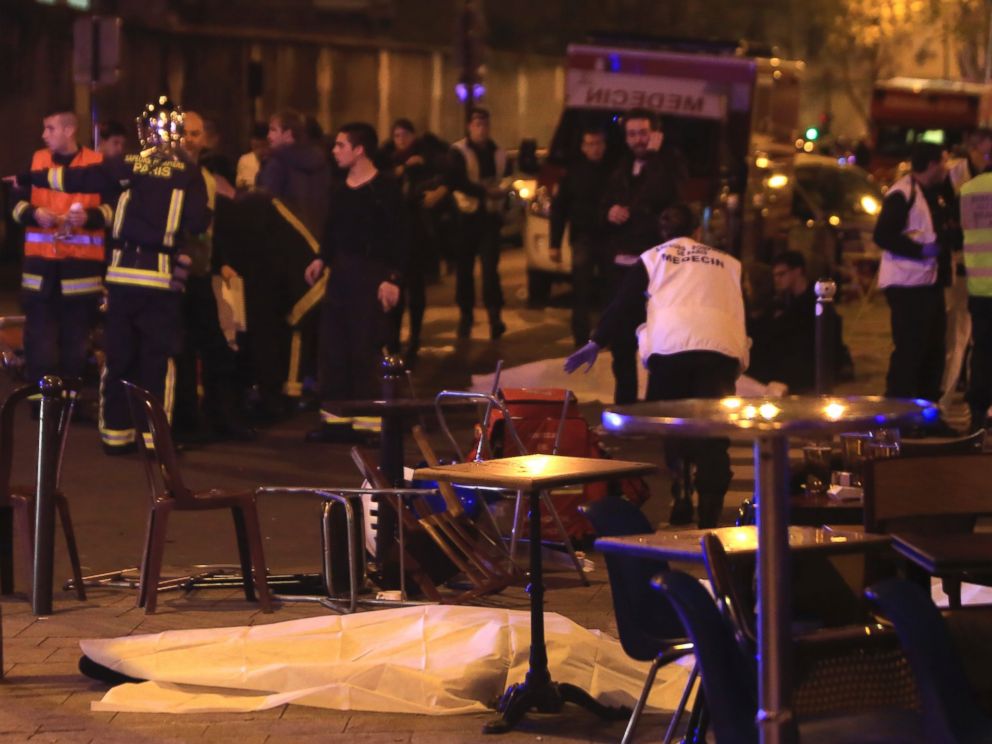
Remember “freedom fries?” That was how some Americans expressed their spite toward France when that nation, with vastly more experience than ours in the Middle East, wisely declined the opportunity to participate in George W. Bush‘s ego-driven war on Iraq. There was a congresswoman from Florida who called for exhuming our military graves and bringing the remains home. She was ignorant of the fact that a grateful France had ceded those sites to the United States forever. The heartbreakingly beautiful cemetery atop the Normandy beachhead is as much American soil as Arlington itself. But in Paris on Friday, France paid a terrible price for the chaos we created when we invaded Iraq and destroyed its government with no thought of history or of the consequences beyond the premature boast, “Mission accomplished.” The evil we didn’t know proved to be worse than the evil we did. Saddam Hussein, for all his crimes, was a stabilizing influence on Iraq and an effective counterweight to Iran – which, unlike Iraq, had declared its enmity of the U.S. and remains an essential ally of the Syrian dictatorship that provides the so-called Islamic State with a plausible raison d’etre. When Bush’s civilian viceroy sacked the entire Iraqi army, he created legions of recruits for al-Qaida and its successor, the Islamic State of Iraq and Syria – aka ISIS. Our failure in nation-building created a corrupt prime minister, Nouri Kamal al- Maliki, whose refusal to renew the status of forces agreement gave President Obama no choice, whatever other he might have chosen, but to bring all our troops home. No president of either party could have left them there exposed to Iraqi laws, arrests and prosecutions. To understand this history is to be warned against repeating it. But America doesn’t learn that lesson very well. Vietnam should have taught us the difficulty of imposing our values on a different culture and to be leery of war where our national interest is not at stake. But the only lesson the politicians took to heart from that unpopular lost war was to abandon the draft and fight the next one with a volunteer force, a force that has been cruelly abused with too many successive combat deployments. In the aftermath of the Paris massacres, we will be hearing again, from the usual suspects, that it’s time to unleash American military might to whatever extent it takes to exterminate ISIS. But even if we could do that – and we can’t – something else would take its place, just as the burgeoning ISIS supplanted a decapitated al-Qaida. The Democratic presidential candidates were right as they agreed, in their separate ways Friday night, that the fight against ISIS must be led by the Muslim states that are the radical movement’s primary intended victims. The United States can help, and should. We are helping already, as are the French, and there is surely more that we can do, short of sending sophisticated weapons to dubious allies who might surrender them to ISIS. But it cannot be seen as an American war, or as French or British. The more important point is that the ultimate solution can not be military. That can only prolong the strife and suffering. By coincidence, the Imam of Asheville’s Muslim community, Egyptian-born Mohamed Taha, was the scheduled speaker Sunday at a brunch sponsored by the Brotherhood of my Reform Jewish congregation. It was well-attended. He talked mainly about the beliefs of Islam and its many similarities to Judaism, and its devotion to peace. But the slaughter at Paris hovered over the morning. “These people,” he said, speaking of ISIS and its ilk, “they are extremists. The majority of Muslims don’t consider these people as Muslims. Mohamed warned against such people … they take some verse of the Koran and they twist its meaning. “They don’t,” he added, “consider us as Muslims.” To defeat the jihadists, he said, requires overcoming the conditions they exploit. “They live in poverty,” he said of the populations where the jihadists enlist most of their support. “They have nothing. We have to help them to establish good countries, good communities. They have nothing in this life, so the extremists promise them everything in the next life.” The solution is not military. The wiser of our American experts on the Middle East, notably including The New York Times columnist Thomas Friedman, have been saying that for years. After World War II, the United States deployed a non-military solution, the Marshall Plan, to help a ravaged Europe rise to its feet in democracy rather than communism. We surely could use a Marshall plan for the Middle East. But how to help the people there to their feet without having the assistance stolen by the corruption that is endemic among the rulers there? I asked that question. Taha acknowledged the difficulty. It begins, he said, with affording an American education, steeped in American traditions and values, to Middle Eastern students who want to study here. Inevitably, perhaps, some few of those students will have other values in mind, like those who prepared here for 9/11. And in the aftermath of Paris, there are politicians who would slam the door, to students as well as refugees, for fear of the few who would exploit our hospitality. But that would be a mistake. It would betray that our values are not, in truth, what we would wish them to be. It would postpone the redemption of the Middle East and perpetuate a war that cannot be won by arms alone. Martin Dyckman is a retired associate editor of the newspaper formerly known as the St. Petersburg Times. He lives in Asheville, North Carolina.


